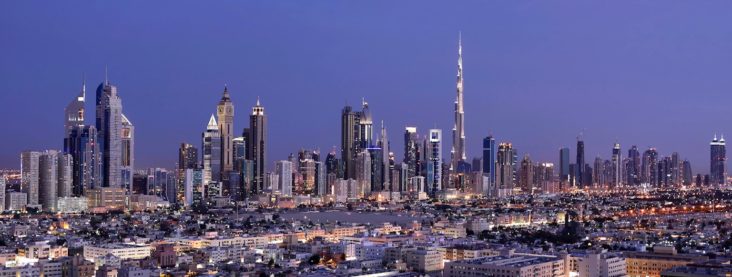Expo 2020 Dubai To Receive The World In 430 Days

In 430 days, the world will witness a key international event, the Expo 2020 Dubai, which will be a cultural platform for gathering countries for 173 days in one place, to showcase their cultures, heritage and histories to 25 million potential visitors.
Participating countries are looking forward to the event, where intellectuals will meet to shape the future and explore Dubai’s experience in turning the desert into a green and sustainable oasis decorated with unique buildings, covering an area of 4.38 square kilometres.
While countries are announcing the designs for their pavilions, Dubai is turning the event’s location into an artistic scene full of greenery and water, to capture the attention of visitors and followers from around the world.
Dubai has succeeded in turning the desert into an oasis full of greenery and water, by using limited amounts of water during construction, as well as irrigation to preserve this important resource.
As in previous editions of the expo, the greenery and flora of its pavilions and courtyards were quite visible, and Dubai has cooperated with the Dubai Municipality in creating sustainable greenery and rationalising water consumption.
The Expo 2020 Dubai has adopted water consumption systems and is reusing different water sources, such as wastewater, air conditioning water, groundwater discharge management and seasonal surface water flows.
The event’s location will feature large areas for open-air celebrations, decorated by plants that rely on drip irrigation techniques, including the Al Fursan Park that accommodates 2,500 people, and the Jubilee Park that accommodates 15,000 people.
In a statement to the Emirates News Agency, WAM, Ahmed Al Khateeb, CEO of Development and Real Estate Development at the Expo 2020 Dubai, said, “The expo will not only feature buildings and pavilions that will impress visitors, but also trails, fountains and parks that will capture their attention, as well as the Al Wasl Dome, which will serve as a giant screen.”
Al Khateeb noted that the expo allocated an area of 220,000 square metres to a nursery for plants and trees, which will cultivate 12,157 trees, including palm trees, over 256,000 shrubs, thousands of flowering plants and herbs, in cooperation with the Dubai Municipality.
He added that selected plants are either indigenous or are adaptable to Dubai’s environment, noting that expo has employed eco-friendly methods in the design and construction stages of the nursery. Solar-powered lights were installed along the main road and the nursery’s team relies exclusively on organic fertilisers and recycle the nursery’s waste.
Treated wastewater provided by the Dubai Municipality is used to meet the majority of the nursery’s irrigation needs and clean drinking water is only used for seed development during the first stages of plant development, he further added.
Taleb Abdulkareem Jilfar, Executive Director of the Infrastructure Services Division at the Dubai Municipality, highlighted the cooperation between the municipality and the Expo team in many areas, such as landscaping.
“The Dubai Municipality is implementing irrigation and agriculture projects at the event’s location,” he told WAM, adding that since the UAE is hosting the expo, the Dubai Municipality has drafted strategic plans for the event, most notably by constructing key infrastructure to accommodate many expected visitors.
Jilfar estimates the cost of the expo’s irrigation and landscaping projects to be over AED277 million, noting that an area of 3.57 square kilometres is expected to be ready before the official launch of the exhibition in October 2020. The municipality has delivered 863,117 plants, valued at more than AED22.5 million.
Jilfar considers the project as a significant addition to the landscape of the area, where trees will serve as a green barrier and reduce the amount of sand and dust in the air while pointing out the municipality’s efforts to implement the “Integrated Dubai Strategy to Protect Water Resources 2030,” by utilising dripping and spray technologies in irrigation projects instead of traditional irrigation methods, as well as using suitable agricultural soils that help to conserve water and reduce evaporation.
Jilfar affirmed that the municipality is currently launching a range of strategic projects, intending to fulfil the future needs of Dubai, and in preparation for hosting the expo. These projects include a tunnel project for rainwater drainage, which is scheduled to be completed before the launch of the event in Dubai, he further added.
The expo office has received achievement certificates from the municipality confirming the completion of the opportunities area, the movement area and the sustainability area at the expo site, which includes 86 multi-purpose buildings.
Water is a rare natural resource in the UAE, and around 42 percent of its drinking water is obtained through desalination.
In line with the “UAE Water Security Strategy 2036,” the expo drafted its water strategy that focusses on reducing demand for drinkable water, by adopting a hierarchy of use and using non-drinkable water for cleaning and irrigation.
A team from the “Expo Live-EXPO 2020 Dubai International Innovation and Partnership Programme” is cooperating with the “Desert Control Company” to test liquid clay nanoparticles in the expo’s Innovation Park, by mixing the soil in some ponds with synthetic mud.
The “Expo 2020 Dubai Hosting Readiness Follow-Up Committee,” launched by H.H. Sheikh Ahmed bin Saeed Al Maktoum, Chairman of the Supreme Exo 2020 Dubai Committee, held its third meeting in June 2019, chaired by Mohammed Ibrahim Al Shaibani, Director-General of the Dubai Ruler’s Court, to discuss the preparations for the event by various local authorities. All government authorities in the UAE are also cooperating to ensure the event’s success.


